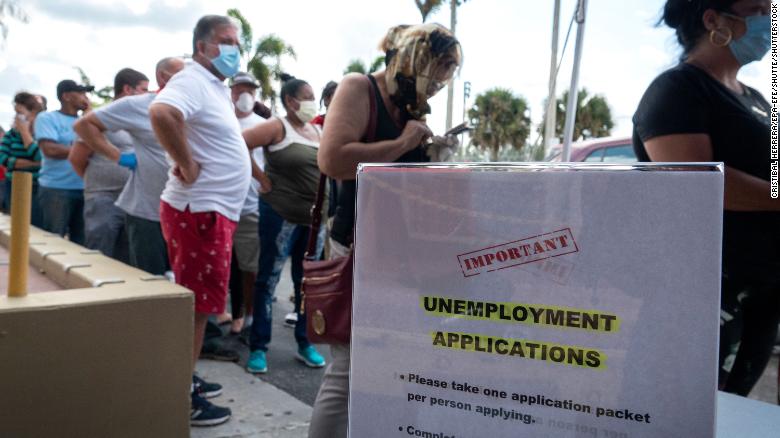President Trump said Tuesday that the coronavirus relief talks were over until after the election, abruptly ordering Treasury Secretary Steven Mnuchin to stop negotiating with House Speaker Nancy Pelosi.
In a series of tweets posted less than 24 hours after he was released from the hospital, and still dealing with a Covid-19 diagnosis, Trump accused Pelosi of failing to negotiate in good faith, after she rejected an opening bid from Mnuchin in their latest round of talks.
“I have instructed my representatives to stop negotiating until after the election when, immediately after I win, we will pass a major Stimulus Bill that focuses on hard-working Americans and Small Business,” Trump wrote.
His tweets sent the stock market suddenly lower, as many businesses, households, and investors had been hoping for a sudden jolt of fiscal stimulus amid signs the economy was beginning to soften.
The Dow Jones Industrial Average fell by about 330 points, or by 1.2 percent.
The Nasdaq and S&P 500 also fell.
The pronouncement came just hours after Federal Reserve Chair Jerome H. Powell said in a speech that more economic stimulus was needed.
Barring another unexpected development, Trump’s declaration kills any chance of new aid for millions of Americans who remain out work and at risk of eviction.
In the string of Twitter posts Tuesday afternoon, Trump misstated the health of the U.S. economy.
He wrote that “Our economy is doing very well. The stock market is at record levels. JOBS and unemployment…also coming back in record numbers.”
Even some of Trump’s top advisers have said the economy is not doing very well and that more assistance is needed.
Further, the stock market is not at record levels, and it also doesn’t reflect the broader health of the economy.
The unemployment rate has come down from its April peak of around 15 percent, but it is still at 8.4 percent and millions of Americans are struggling to pay their bills, afford food, and find jobs.
The U.S. economy has barely recovered half of the jobs lost in March and April, and Trump is set to be the first president in modern history to end his first term with a net loss of American jobs.
Trump said he instead planned to pass a stimulus bill after the election “immediately after I win…that focuses on hardworking Americans and Small Business.”
Pelosi and Mnuchin had been working on assembling a new relief bill somewhere between $1.6 trillion — which was Mnuchin’s opening offer — and $2.2 trillion, which was the size of a stimulus bill passed last week by House Democrats.
Talks had been moving slowly but appeared to be progressing. Pelosi last week expressed optimism about reaching a deal, although many Republicans had been skeptical.
The Trump tweets landed while House Democrats were in the middle of a conference call during which Pelosi was updating them on the status of her talks with Mnuchin.
She had been telling them that they remained divided on issues including state and local funding, and coronavirus testing.
A few minutes after Trump tweeted that the talks were over, Pelosi told lawmakers on the call what the president had said and then quickly got off the call, according to people listening in.
“Clearly, the White House is in complete disarray,” Pelosi said in a statement after Trump’s announcement.
She said that because of the White House’s move, “over time, household insolvencies and business bankruptcies will rise, harming the productive capacity of the economy and holding back wage growth.”
The spending package was supposed to send another round of $1,200 checks to millions of Americans, provide new unemployment benefits for the jobless, direct a new round of small business aid, and a range of other measures.
Congress has not acted to pass economic or health care relief legislation since the spring, when lawmakers came together around four bipartisan bills totaling some $3 trillion in total spending, an unprecedented sum.
But many of the programs approved at that time, such as small business relief and enhanced unemployment benefits, have since expired, in some cases months ago.
The U.S. economy faces severe consequences without additional federal support, and the labor market has shown signs of softening particularly as a number of companies last week announced big plans for layoffs.
The airline industry is preparing to implement more than 30,000 furloughs in the coming weeks, and some surveys have found as many as 40 percent of restaurants will close within six months without additional aid.
Tens of millions of Americans who have lost their jobs will receive no federal unemployment supplement absent an additional package with Congress, draining the U.S. consumer market and a key source of stimulus.
Personal incomes already dropped in August as coronavirus relief approved this spring expired.
Powell issued a dire warning on Tuesday about the potential consequences of Congress and the White House failing to pass an additional stimulus deal.
“Too little support would lead to a weak recovery, creating unnecessary hardship for households and businesses,” Powell said.
Pelosi last week urged airlines to hold off on layoffs pending a deal, saying that an airline payroll support program would be extended either as part of an overall deal or a stand-alone bill. It’s unclear now whether that will move forward.
Source: The Washington Post
